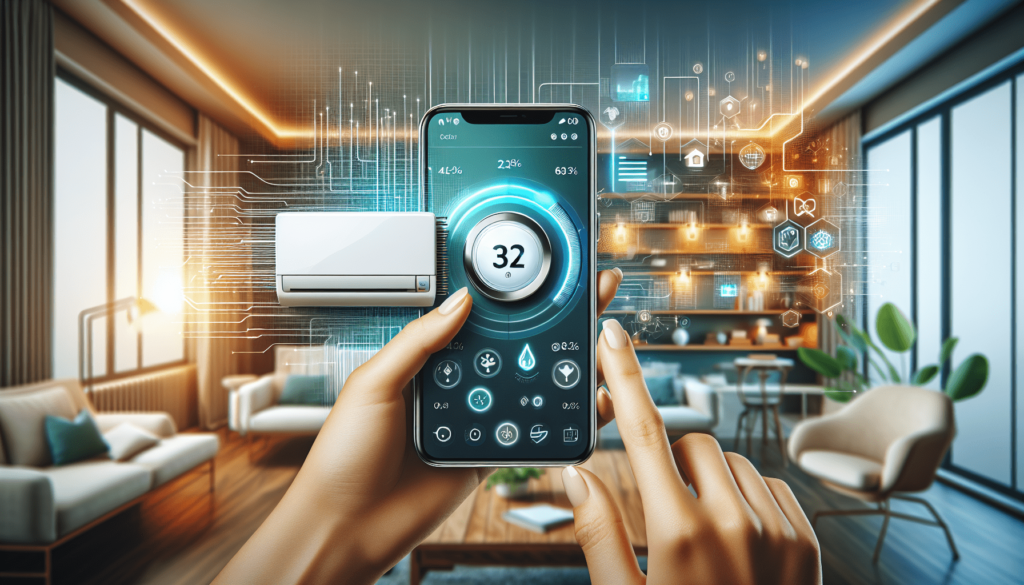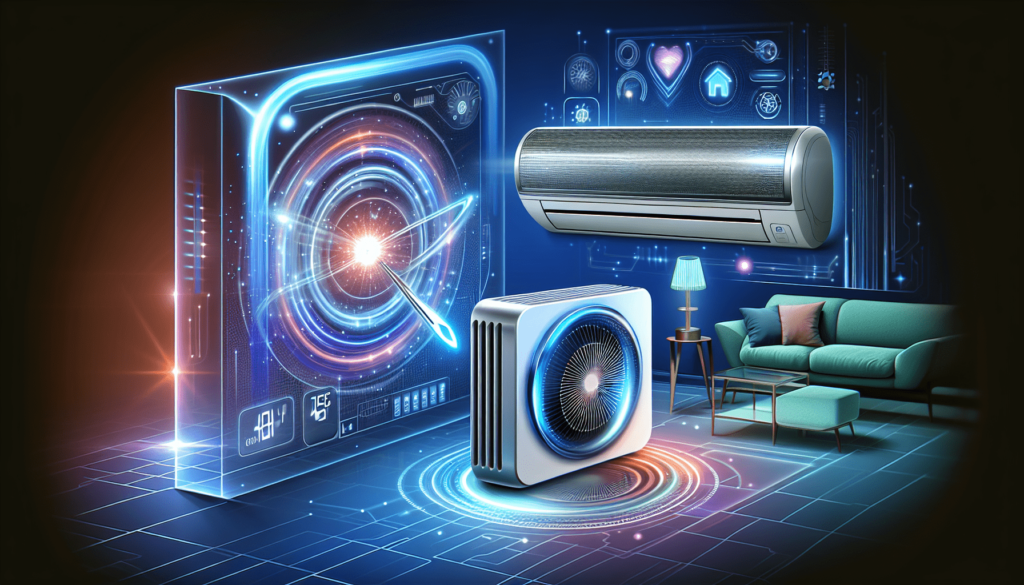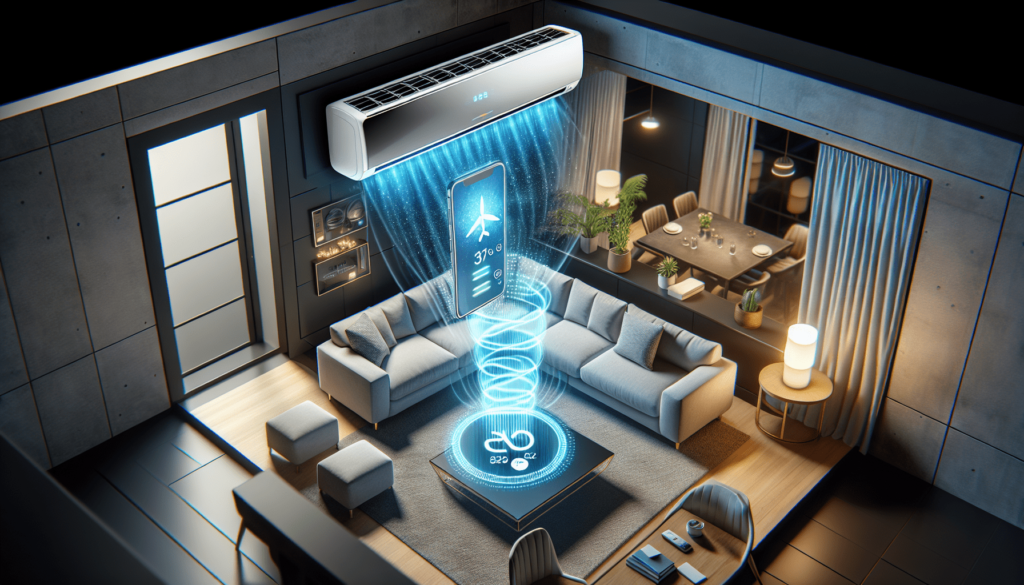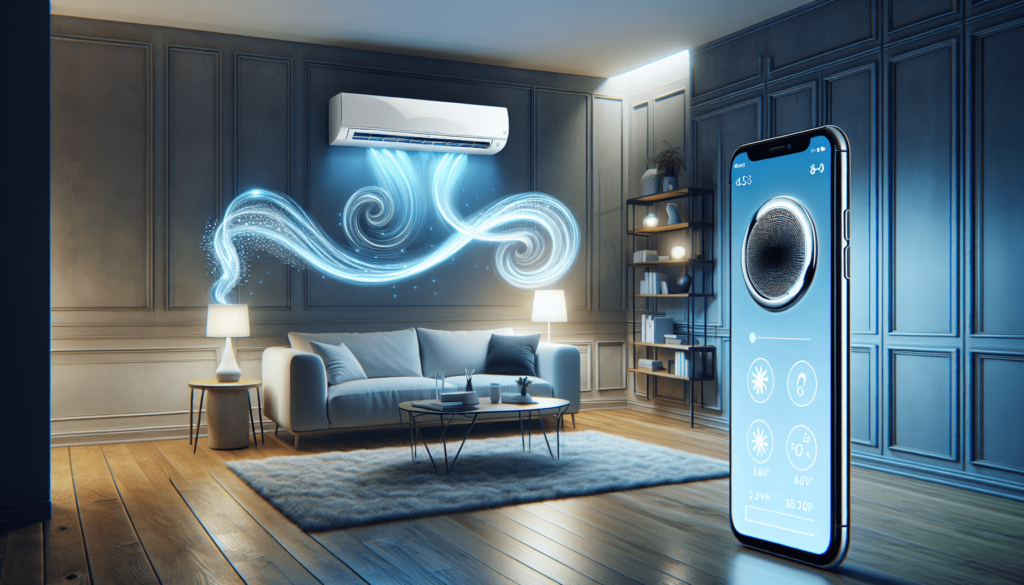7March 2024
Imagine the luxury of coming home to a perfectly cooled and comfortable space, without even lifting a finger. With a smart air conditioning system, this dream can become a delightful reality. Gone are the days of manual temperature adjustments and guessing when to turn on or off the AC. By upgrading to a smart air conditioning system, you gain the convenience and control of managing your home’s climate effortlessly, improving energy efficiency, and ultimately enhancing your overall comfort. Say goodbye to the old ways of cooling, and say hello to a smarter, smarter way to enjoy a perfectly balanced indoor environment.
Effective Energy Management
Reduced energy consumption
Upgrading to a smart air conditioning system offers numerous benefits, starting with reduced energy consumption. Traditional air conditioning units often run continuously, resulting in high energy bills. However, smart AC systems are equipped with energy-saving features like sensors and timers that regulate the cooling process. These systems can detect when a room is empty and automatically adjust the temperature, ensuring that energy is not wasted. By optimizing the energy usage, you can significantly lower your electricity consumption and contribute to a more sustainable environment.
Efficient cooling techniques
Another advantage of upgrading to a smart air conditioning system is the implementation of efficient cooling techniques. These systems utilize advanced technologies such as variable speed compressors and smart fans to provide precise and consistent cooling. Unlike conventional AC units that constantly turn on and off, smart systems can adjust the cooling capacity based on the room’s temperature and humidity. This not only ensures optimal comfort but also maximizes energy efficiency by avoiding unnecessary fluctuations and overheating.
Presence of Energy star ratings
When considering a smart air conditioning system, it’s important to look for units that have Energy Star ratings. Energy Star is a program established by the U.S. Environmental Protection Agency (EPA) to identify and promote energy-efficient products. AC systems with Energy Star ratings have been independently certified to meet strict energy efficiency guidelines. By choosing an Energy Star-certified smart AC, you can be confident that you’re investing in a system that will help you save on energy costs while minimizing your impact on the environment.
Increased Convenience
Remote control access
One of the key benefits of upgrading to a smart air conditioning system is the ability to control it remotely. With the help of mobile apps or smart home assistants like Amazon Alexa or Google Assistant, you can conveniently adjust the temperature, set schedules, and even monitor energy usage from anywhere. Whether you’re at work or on vacation, you can ensure your home is at the perfect temperature when you return. Remote control access eliminates the need to manually adjust the thermostat and provides a hassle-free way to manage your cooling system.
Presence of programmable thermostats
Smart AC systems often come with programmable thermostats, which allow you to set customized cooling schedules for different days and times. Rather than cooling an empty house all day or waking up to a stuffy room, programmable thermostats give you the flexibility to optimize cooling based on your daily routine. For example, you can program the AC to start cooling your bedroom before you wake up and then adjust the temperature to save energy while you’re at work. This feature enhances convenience and ensures that you always enjoy a comfortable home environment.
Monitoring and adjustment of the cooling schedule
In addition to programmable thermostats, smart AC systems provide the ability to monitor and adjust the cooling schedule in real-time. By using the mobile app or smart home assistant, you can check the current temperature in each room and make immediate adjustments if needed. This level of control allows you to maximize energy efficiency while ensuring personalized comfort. Whether you want to cool a specific room before guests arrive or adjust the temperature based on the weather conditions, monitoring and adjusting the cooling schedule puts you in complete control of your indoor environment.

Optimized Comfort
Advanced temperature control
Upgrading to a smart air conditioning system brings a whole new level of temperature control and customization. Traditional AC units often provide limited options for adjusting the temperature, leaving you either too cold or too hot. Smart AC systems, on the other hand, offer precise temperature control, allowing you to set your desired comfort level with greater accuracy. Some systems even have advanced features like individual temperature control for each room, ensuring that everyone in your home can enjoy their preferred climate.
Variety of cooling modes
Smart AC systems also offer a variety of cooling modes to cater to different preferences and situations. For example, you may choose a sleep mode that gradually adjusts the temperature throughout the night for a more comfortable sleep. Some systems have a turbo mode for rapid cooling during hot summer days, while others offer energy-saving modes that prioritize efficiency. The availability of multiple cooling modes ensures that you can tailor the AC system’s operation to suit your specific needs, providing enhanced comfort and flexibility.
Zone-specific cooling capabilities
One of the most significant advantages of smart air conditioning systems is their ability to provide zone-specific cooling capabilities. Traditional AC units typically have a single thermostat that controls the temperature for the entire house, resulting in inconsistent comfort levels. Smart systems, however, allow you to create zones within your home and set individual temperature preferences for each zone. This means you can prioritize cooling in high-traffic areas during the day while keeping unoccupied rooms at a higher temperature, ultimately optimizing comfort and energy efficiency.
Improved Indoor Air Quality
Integrated air filtration systems
Indoor air quality is a vital aspect of a comfortable and healthy home environment. Smart air conditioning systems often come equipped with integrated air filtration systems that remove dust, pollen, and other pollutants from the air. These filtration systems help improve the air quality by capturing airborne particles, reducing the risk of allergies and respiratory issues. By upgrading to a smart AC system with advanced air filtration capabilities, you can ensure that the air you and your family breathe is clean and fresh.
Humidity control features
Excessive humidity levels can lead to discomfort, mold growth, and even health problems. Smart air conditioning systems offer humidity control features that allow you to maintain the ideal humidity level in your home. With the ability to adjust and monitor the humidity settings, you can prevent condensation, eliminate that sticky feeling, and create a more pleasant indoor environment. Humidity control not only contributes to improved comfort but also helps protect your furniture, electronics, and overall indoor air quality.
Ventilation improvements for better air circulation
Proper air circulation is essential for a healthy and comfortable home. Unfortunately, traditional AC systems often recirculate the same stale air without bringing in fresh outdoor air. Smart AC systems address this issue by integrating ventilation improvements that enhance air circulation. Some systems can automatically bring in fresh air at specific intervals or detect when ventilation is needed based on indoor air quality sensors. By improving air circulation, smart AC systems help to minimize stuffiness, reduce odors, and create a more rejuvenating living space.

Reduced Maintenance and Repair Costs
Self-diagnosis and error reporting
Maintenance and repair costs are a concern for any cooling system. However, smart air conditioning systems come with self-diagnosis and error reporting features that can significantly reduce these costs. When a problem occurs, the system can detect and diagnose the issue, providing detailed error reports that help you understand the problem. This information makes it easier for HVAC professionals to identify and fix the problem efficiently, eliminating unnecessary diagnostic time and reducing repair costs.
Increased lifespan due to smart components
Smart AC systems are designed with advanced components that not only improve functionality but also extend the lifespan of the system. These intelligent components are built to operate more efficiently and endure less wear and tear over time. By investing in a smart AC system, you can enjoy the benefits of a longer-lasting cooling solution. The increased lifespan reduces the frequency of replacement or major repairs, ultimately saving you money in the long run.
Lessened manual upkeep
Conventional air conditioning systems often require regular manual upkeep, such as cleaning or replacing filters, and scheduling professional maintenance. Smart AC systems simplify the maintenance process by automating certain tasks. For example, the system can remind you when it’s time to clean or replace filters, ensuring that your AC always operates at its optimal efficiency. Additionally, some smart AC systems offer remote diagnostics, allowing HVAC professionals to assess the system’s performance without the need for an in-person visit. These automated features take the hassle out of maintenance, making it easier for you to keep your AC running smoothly throughout its lifespan.
Increased Property Value
Boost in home resale value
Upgrading to a smart air conditioning system can significantly boost the resale value of your home. Prospective buyers are increasingly looking for energy-efficient features and smart home integration when searching for a new property. By having a smart AC system in place, you demonstrate your commitment to sustainability and modern living. This added value and appeal can help your home stand out in the market and potentially fetch a higher selling price.
Increased allure for potential buyers
A smart air conditioning system not only increases the value of your property but also enhances its appeal to potential buyers. Smart home features, like remote control access and programmable thermostats, offer convenience, comfort, and energy savings. These features create a desirable living environment that can attract more buyers and help sell your home quicker. When upgrading to a smart AC system, you are investing in a feature that adds an element of luxury and sophistication to your home, making it more enticing to a wide range of buyers.
Overall enhancement in property aesthetics
Aside from the tangible benefits, upgrading to a smart air conditioning system can also improve the overall aesthetics of your property. Smart AC systems often feature sleek and modern designs that seamlessly integrate into your home’s interior. Gone are the bulky and outdated thermostats, replaced by stylish touch interfaces or minimalist displays. By upgrading to a smart AC system, you not only elevate the functionality of your cooling system but also enhance the visual appeal and ambience of your living space.

Integration with Smart Home Systems
Compatibility with other smart devices
One of the key advantages of smart air conditioning systems is their compatibility with other smart home devices. Whether you have smart lighting, security cameras, or voice-activated assistants, smart AC systems can seamlessly integrate with your existing setup. This integration allows you to create a cohesive and interconnected smart home ecosystem, where you can control multiple devices through a single platform or voice commands. The convenience of managing various aspects of your home from one central hub adds an extra layer of simplicity and ease to your everyday life.
Streamlined control via common platforms
Smart AC systems often provide streamlined control via common platforms such as mobile apps or voice assistants. Through these platforms, you can control and monitor your smart AC system along with other connected devices in your home. Imagine adjusting the temperature, turning on the lights, and locking the doors with just a few taps on your smartphone or a simple voice command. Streamlined control eliminates the need for multiple apps or interfaces, simplifying the management of your smart home and ensuring a smooth and intuitive user experience.
Automated routines and ambience control
By integrating a smart air conditioning system into your smart home setup, you can take advantage of automated routines and ambience control. For example, you can program your air conditioning to turn on when you arrive home or adjust the temperature based on the time of day. Additionally, smart AC systems can work in conjunction with other devices to create customized ambience settings. Imagine your lights dimming, curtains closing, and your favorite music playing as your AC system sets the perfect temperature for a cozy movie night. These automated routines and ambience control options add convenience and personalization to your living space.
Eco-Friendly Alternatives
Contribution to reducing carbon footprint
With the increasing emphasis on sustainability, upgrading to a smart air conditioning system allows you to contribute to reducing your carbon footprint. Smart AC systems are designed to optimize energy usage, resulting in less energy wastage and lower greenhouse gas emissions. By investing in a more energy-efficient system, you actively participate in mitigating climate change and creating a greener future. Upgrading to a smart AC system aligns with environmentally conscious living and can inspire others to make similar choices.
Use of green refrigerants
In addition to energy efficiency, smart air conditioning systems also prioritize the use of green refrigerants. Traditional AC units often rely on refrigerants like R-22, which are harmful to the ozone layer and contribute to global warming. Smart AC systems, on the other hand, employ more environmentally-friendly refrigerants such as R-410A or R-32. These refrigerants have a lower impact on the environment, making smart AC systems an eco-friendly alternative for cooling your home.
Reduced waste production due to long-lasting parts
Traditional AC units often require frequent replacement of parts, resulting in increased waste production. Smart AC systems, with their advanced components and longer lifespan, significantly reduce the need for replacement parts. By investing in a smart AC system, you contribute to minimizing waste generation and conserve valuable resources. The durability and reliability of these systems ensure that they can serve your cooling needs for an extended period, making them a sustainable choice for your home.

Enhanced Safety Measures
Automated function controls
Smart air conditioning systems incorporate automated function controls to enhance safety measures. These systems can detect anomalies, such as abnormal temperature fluctuations or excessive electricity consumption, and automatically shut down or enter a protective mode. This proactive approach helps prevent potential malfunctions or safety hazards, giving you peace of mind knowing that your AC system is continuously monitored for optimal performance.
Advanced safety features
Smart AC systems also come with advanced safety features that further safeguard your home and loved ones. Some systems have built-in fire and flood sensors that can detect smoke or water leaks, triggering immediate alerts or shutting down the AC system to prevent further damage. Additionally, smart AC systems often undergo rigorous safety testing and certifications to ensure compliance with industry standards. With these advanced safety features, you can rest assured that your smart AC system is designed to prioritize the well-being of your household.
Maintained cooling in case of technical issues
Technical issues with traditional AC units can leave you without cooling during the hot summer months. However, smart air conditioning systems are designed to provide maintained cooling even in the event of technical issues. These systems have fail-safe mechanisms that ensure partial or limited cooling if a major malfunction occurs. This feature prevents complete system failure and allows you to maintain a comfortable indoor environment while waiting for repairs. With smart AC systems, you can enjoy uninterrupted cooling and avoid the inconvenience and discomfort of extended downtime.
Cost Savings and Return on Investment
Reduced electricity bills
One of the most compelling reasons to upgrade to a smart air conditioning system is the potential for significant cost savings on electricity bills. By optimizing energy usage and delivering precise cooling, smart AC systems can drastically reduce your energy consumption. Lower energy consumption translates to lower electricity bills, saving you money month after month. Over time, these savings can add up to a substantial amount, making the initial investment in a smart AC system a financially wise decision.
Government incentives for energy-efficient units
To encourage sustainable practices, many governments provide incentives for those who invest in energy-efficient units. This includes smart air conditioning systems that meet certain energy efficiency criteria. These incentives may include tax credits, rebates, or subsidized installation costs. By taking advantage of these government incentives, you can offset the initial cost of upgrading to a smart AC system and enjoy improved comfort and savings.
Long-term financial benefits outweighing initial costs
While upgrading to a smart air conditioning system may involve an initial investment, the long-term financial benefits far outweigh the upfront costs. Smart AC systems have longer lifespans, reduced maintenance requirements, and lower energy consumption, resulting in savings over the system’s lifetime. With proper usage and regular maintenance, a smart AC system can offer reliable cooling and cost savings for many years, making it a smart financial choice in the long run.
In conclusion, upgrading to a smart air conditioning system offers a wide range of benefits that enhance your comfort, convenience, and overall quality of life. From reduced energy consumption and efficient cooling techniques to improved indoor air quality and increased property value, smart AC systems provide a comprehensive solution for cooling your home. With integration with smart home systems, eco-friendly alternatives, enhanced safety measures, and the potential for cost savings and return on investment, upgrading to a smart air conditioning system is a long-term investment that brings comfort, convenience, and sustainability to your home. So, why wait? Upgrade to a smart AC system today and experience the many advantages it has to offer.
